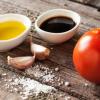CYBERMED LIFE - ORGANIC & NATURAL LIVING
CYBERMED LIFE - ORGANIC & NATURAL LIVING
 Mediterranean Diet: The Mediterranean diet is a diet inspired by the eating habits of Greece, Southern Italy, and Spain in the 1940s and 1950s. The principal aspects of this diet include proportionally high consumption of olive oil, legumes, unrefined cereals, fruits, and vegetables, moderate to high consumption of fish, moderate consumption of dairy products (mostly as cheese and yogurt), moderate wine consumption, and low consumption of non-fish meat products.
Mediterranean Diet: The Mediterranean diet is a diet inspired by the eating habits of Greece, Southern Italy, and Spain in the 1940s and 1950s. The principal aspects of this diet include proportionally high consumption of olive oil, legumes, unrefined cereals, fruits, and vegetables, moderate to high consumption of fish, moderate consumption of dairy products (mostly as cheese and yogurt), moderate wine consumption, and low consumption of non-fish meat products.
There is some evidence that the Mediterranean diet lowers the risk of heart disease and early death. Olive oil may be the main health-promoting component of the diet. There is preliminary evidence that regular consumption of olive oil may lower all-cause mortality and the risk of cancer, cardiovascular disease, neurodegeneration, and several chronic diseases.
In 2013, UNESCO added the Mediterranean diet to the Representative List of the Intangible Cultural Heritage of Humanity of Italy (promoter), Spain, France, Portugal, Morocco, Greece, Cyprus, and Croatia. It was chosen because "The Mediterranean diet involves a set of skills, knowledge, rituals, symbols and traditions concerning crops, harvesting, fishing, animal husbandry, conservation, processing, cooking, and particularly the sharing and consumption of food."